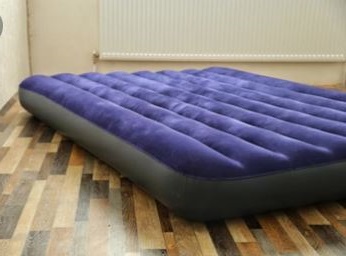Air mattresses are very popular and versatile thanks to their compact size when deflated and their quick setup. If you’ll be camping or hauling your air mattress, you’re probably wondering: how much does an air mattress weigh? There’s a few factors that affect the weight of your air mattress including the size, materials, and pump parts included.
The average air mattress weighs around 10 pounds. Twin air mattresses weigh around 8.5 pounds, full size air mattresses weigh around 10 pounds, and queen size air mattresses weigh around 12.5 pounds.
You should be careful not to confuse how much an air mattress weighs with an air mattress weight limit.
The air mattress weight is how much it weighs to carry, while it’s limit determines the total pounds it can hold without popping or risking damage.
How Much Does A Twin Air Mattress Weigh?
Twin size air mattresses are the most common and typically weigh around 8.5 pounds.
How Much Does A Twin XL Air Mattress Weigh?
Twin XL size air mattresses typically weigh around 9 pounds.
How Much Does A Full Size Air Mattress Weigh?
Full size air mattresses typically weigh around 10 pounds.
How Much Does A Queen Size Air Mattress Weigh?
Queen air mattresses typically weigh around 12.5 pounds.
How Much Does A King Size Air Mattress Weigh?
King air mattresses typically weigh around 15 pounds.

Factors That Affect How Much An Air Mattress Weighs
As we mentioned above, there are a few considerations that will affect the total weight of your air mattress.
Size
This is straightforward: the larger your air mattress, the more material is used, so the bigger air mattress you have, the heavier it will be.
Considering that fact, a twin size air mattress is going to weigh much less than a king size air mattress.
While we’re on the subject of air mattress size, make sure to pick a tent that can fit an air mattress or that yours will fit in your existing tent.
Profile
The profile of an air mattress means how tall or thick it is.
Most air mattresses typically come in three profiles: low-profile, mid-profile, and raised profiles:
- Low profile air mattresses are typically 4”-8” thick when inflated.
- Mid profile air mattresses are typically 9”-14” thick when inflated.
- Raised profile air mattress are typically 15-24” thick when inflated.
Just like the sizing above, the taller the mattress, the more material, which makes taller mattresses heavier.
Materials
Most air mattresses are made out of PVC or vinyl and are similar in weight across the board, but some mattresses will feature extra headrests, headboards, or extra cushioning materials on the top of the mattress that will add to the weight.
The more features an air mattress has, the more it will weigh.
Construction
Some air mattresses are very simple in their construction, while others may have newer technology to provide extra support and stability while in use.
Some newer air mattresses feature the following enhancements:
Air Coils
Air coils are similar to the normal coils in your regular mattress, except they are supported fully by air inside.
These coils fill up with air when the mattress is inflated, making them stand up straight.
The more air coils a mattress has, the heavier it will be.
Air Beams
Air beams are kind of like air coils, except they run horizontally across the mattress rather than up and down, kind of like thin ribs.
These beams help support mattress and help spread the air out so that if there’s any deflating at all in the mattress, you won’t deal with sagging or a misshapen bed.
The thicker and higher the number of air beams in a mattress, the more it will weigh.
Chambers
Some air mattresses offer two separate chambers that inflate and deflate separately from one another, and often feature a supportive air beam in the middle that help the weight to be distributed evenly.
Some air mattresses that feature dual chambers will even have separate air coils or beams in each chamber to offer extra support and movement isolation.
The weight of an air mattress will increase as more chambers are added.
Pump Parts & Mechanisms
There are many kinds of air mattress pumps available: foot pumps, plug-in electric pumps, battery-operated pumps, and even integrated pumps built right into the mattress.
Many of these pumps can both inflate and deflate the mattress for extra convenience.
That convenience comes at a cost, however: if your air mattress comes with an integrated pump it will be heavier than a basic air bed. An integrated pump can add between 2-3 pounds of extra weight to your air mattress.
Note that it’s kind of a “wash” because even if you’re hauling your air mattress with you to a campsite, you still need to carry some sort of pump either way. You could at least carry a lightweight foot pump rather than a motorized pump if you really wanted to cut down on the weight of your gear.
Does An Inflated Air Mattress Weigh More Than A Deflated One?
Yes! Although it may seem odd that this is true, the air inside the mattress is lightly compressed, which means it’s a little denser (or heavier) than the outside air, so an air mattress weighs slightly more when it’s full compared to when it’s deflated.
How Much Does An Air Mattress Weigh? Wrapping Things Up
All in all, most air mattresses on the market today (even with fancy features and integrated air pumps) shouldn’t weigh more than about 20 pounds on the heaviest side, and as you lose features, height, and size you will also decrease the overall air bed weight.
If you’re thinking of bringing your air mattress along on your camping trip, check out our reviews of the best e port tents so you can power your air mattress (and whatever else you choose) right from the convenience of inside your tent.

